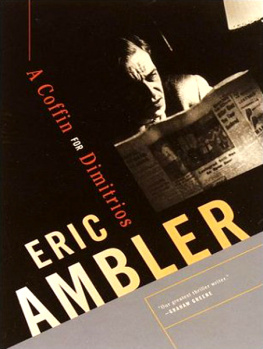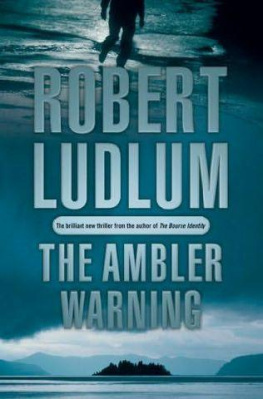Eric Ambler - Epitaph for a Spy
Here you can read online Eric Ambler - Epitaph for a Spy full text of the book (entire story) in english for free. Download pdf and epub, get meaning, cover and reviews about this ebook. genre: Detective and thriller. Description of the work, (preface) as well as reviews are available. Best literature library LitArk.com created for fans of good reading and offers a wide selection of genres:
Romance novel
Science fiction
Adventure
Detective
Science
History
Home and family
Prose
Art
Politics
Computer
Non-fiction
Religion
Business
Children
Humor
Choose a favorite category and find really read worthwhile books. Enjoy immersion in the world of imagination, feel the emotions of the characters or learn something new for yourself, make an fascinating discovery.

- Book:Epitaph for a Spy
- Author:
- Genre:
- Rating:5 / 5
- Favourites:Add to favourites
- Your mark:
- 100
- 1
- 2
- 3
- 4
- 5
Epitaph for a Spy: summary, description and annotation
We offer to read an annotation, description, summary or preface (depends on what the author of the book "Epitaph for a Spy" wrote himself). If you haven't found the necessary information about the book — write in the comments, we will try to find it.
Epitaph for a Spy — read online for free the complete book (whole text) full work
Below is the text of the book, divided by pages. System saving the place of the last page read, allows you to conveniently read the book "Epitaph for a Spy" online for free, without having to search again every time where you left off. Put a bookmark, and you can go to the page where you finished reading at any time.
Font size:
Interval:
Bookmark:
Eric Ambler
Epitaph for a Spy
1
I arrived in St. Gatien from Nice on Tuesday, the 14th of August. I was arrested at 11.45 a.m. on Thursday, the 16th, by an agent de police and an inspector in plain clothes and taken to the Commissariat.
For several kilometers on the way from Toulon to La Ciotat the railway runs very near to the coast. As the train rushes between the innumerable short tunnels through which this section of the line has been built, you catch quick glimpses of the sea below, dazzlingly blue, of red rocks, of white houses among pine woods. It is as if you were watching a magic-lantern show with highly colored slides and an impatient operator. The eye has no time to absorb details. Even if you know of St. Gatien and are looking for it, you can see nothing of it but the bright red roof and the pale yellow stucco walls of the Hotel de la Reserve.
The hotel stands on the highest point of the headland and the terrace runs along the south side of the building. Beyond the terrace there is a sheer drop of about fifteen meters. The branches of pines growing below brush the pillars of the balustrade. But farther out towards the point the level rises again. There are gashes of red rock in the dry green scrub. A few windswept tamarisks wave their tortured branches in silhouette against the intense ultramarine blue of the sea. Occasionally a white cloud of spray starts up from the rocks below.
The village of St. Gatien sprawls in the lee of the small headland on which the hotel stands. The walls of the houses are, like those of most other Mediterranean fishing villages, coated with either white, egg-shell blue, or rose-pink washes. Rocky heights, whose pine-clad slopes meet the seashore on the opposite side of the bay, shelter the miniature harbor from the mistral that sometimes blows strongly from the northwest. The population is seven hundred and forty-three. The majority depend for their livelihoods on fishing. There are two cafes, three bistros, seven shops and, farther round the bay, a police station.
But, from the end of the terrace where I was sitting that morning the village and the police station were out of sight. The day was already warm and the cicadas were droning in the terraced gardens at the side of the hotel. By moving my head slightly I could see, through the balustrade, the small Reserve bathing beach. Two large colored sunshades were planted in the sand. From under one of them two pairs of legs protruded, a womans and a mans. They looked young and very brown. A faint murmur of voices told me that there were other guests out of sight in the shady part of the beach. The gardener, his head and shoulders sheltered from the sun by a huge straw hat, was painting a blue band round the gunwale of an upturned dinghy resting on trestles. A motorboat was Coming round the headland on the far side of the bay and making for the beach. As it came nearer, I could distinguish the thin, lanky figure of Koche, the manager of the Reserve, drooping over the tiller. The other man in the boat was one of the fishermen from the village. They would have been out since dawn. Maybe we should have red mullet for lunch. Out at sea a Nederland-Lloyd liner moved on its way from Marseilles to Villefranche. It was all very good and peaceful.
I was thinking that tomorrow night I would have to pack my suitcase and that early Saturday morning I would have to go by bus into Toulon and catch the train for Paris. The train would be near Arles in the heat of the day, my body would stick to the hard leather seats of the third-class compartment, and there would be a layer of dust and soot over everything. I would be tired and thirsty by the time we reached Dijon. I must remember to take a bottle of water with me, with, perhaps, a little wine in it. I would be glad to get to Paris. But not for long. There would be the walk from the platforms of the Gare de Lyon to the platforms of the Metro. My suitcase would be heavy by then. Direction Neuilly to Concorde. Change. Direction Mairie dIssy to Gare Montparnasse. Change. Direction Porte dOrleans to Alesia. Exit. Montrouge. Avenue de Chatillon. Hotel de Bordeaux. And on Monday morning there would be breakfast standing at the counter of the Cafe de lOrient and another Metro journey, Denfert-Rochereau to Etoile, and a walk down the Avenue Marceau. Monsieur Mathis would be already there. Good morning, Monsieur Vadassy! You are looking very well. This term you will take elementary English, advanced German, and elementary Italian. I myself will take the advanced English. We have twelve new students. There are three businessmen and nine waiters. All are for English. There is none who wishes Hungarian. Another year.
But meanwhile there were the pines and the sea, the red rocks and the sand. I stretched luxuriously and a lizard darted across the tiled floor of the terrace. It stopped suddenly to bask in the sun beyond the shadow of my chair. I could see the pulse beating in its throat. Its tail lay curved in a neat semicircle, making a tangent of the diagonal division between the tiles. Lizards have an uncanny sense of design.
It was this lizard which reminded me of my photographs.
I possess only two objects of value in this world. One of them is a camera, the other a letter dated February 10, 1867, from Deak to von Beust. If someone were to offer me money for the letter I should accept it thankfully; but I am very fond of the camera, and nothing but starvation would induce me to part with it. I am not a particularly good photographer; but I get a lot of pleasure pretending that I am.
I had been taking photographs at the Reserve and had, the previous day, taken an exposed spool into the village chemists shop to be developed. Now, in the ordinary way, I should not dream of letting anyone else develop my films. Half the pleasure of amateur photography lies in doing your own darkroom work. But I had been experimenting, and if I did not see the results of the experiments before I left St. Gatien, I should have no opportunity of making use of them. So I had left the film with the chemist. The negative was to be developed and dry by eleven oclock.
The time was eleven thirty. If I went to the chemists now, I should have time to get back, bathe, and have an aperitif before lunch.
I walked along the terrace, round through the gardens, and up the steps to the road. By now the sun was beating down so fiercely that the air above the asphalt was quivering. I had no hat and when I touched my hair it was burning hot. I draped a handkerchief over my head and walked up the hill, and then down the main street leading to the harbor.
The chemists shop was cool and smelt of perfume and disinfectant. The sound of the doorbell had barely died away before the chemist was facing me over the counter. His eyes met mine, but he seemed not to recognize me.
Monsieur?
I left a spool of film yesterday to be developed.
It is not ready yet.
It was promised for eleven oclock.
It is not ready yet, he repeated steadily.
I was silent for a moment. There was something curious about the chemists manner. His eyes, magnified by the thick pebble-glasses he wore, remained fixed on mine. There was an odd look in them. Then I realized what the look was. The man was frightened.
I remember that the realization gave me a shock. He was afraid of me-I who had spent my life being afraid of others had at last inspired fear! I wanted to laugh. I was also annoyed, for I thought I knew what had happened. He had spoiled the film.
Is the negative all right?
He nodded vehemently.
Perfectly, Monsieur. It is a question only of the drying. If you will be good enough to give me your name and address, I will send my son with the negative as soon as it is ready.
Thats all right, Ill call again.
It will be no trouble, Monsieur.
Font size:
Interval:
Bookmark:
Similar books «Epitaph for a Spy»
Look at similar books to Epitaph for a Spy. We have selected literature similar in name and meaning in the hope of providing readers with more options to find new, interesting, not yet read works.
Discussion, reviews of the book Epitaph for a Spy and just readers' own opinions. Leave your comments, write what you think about the work, its meaning or the main characters. Specify what exactly you liked and what you didn't like, and why you think so.





